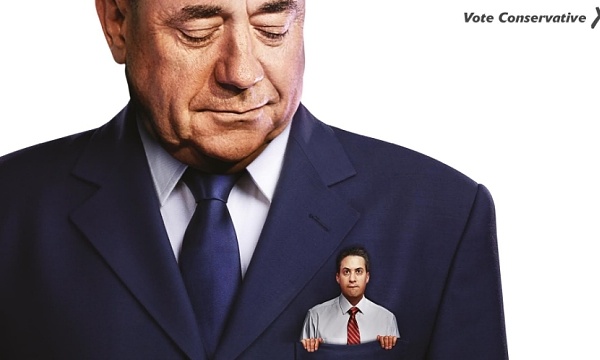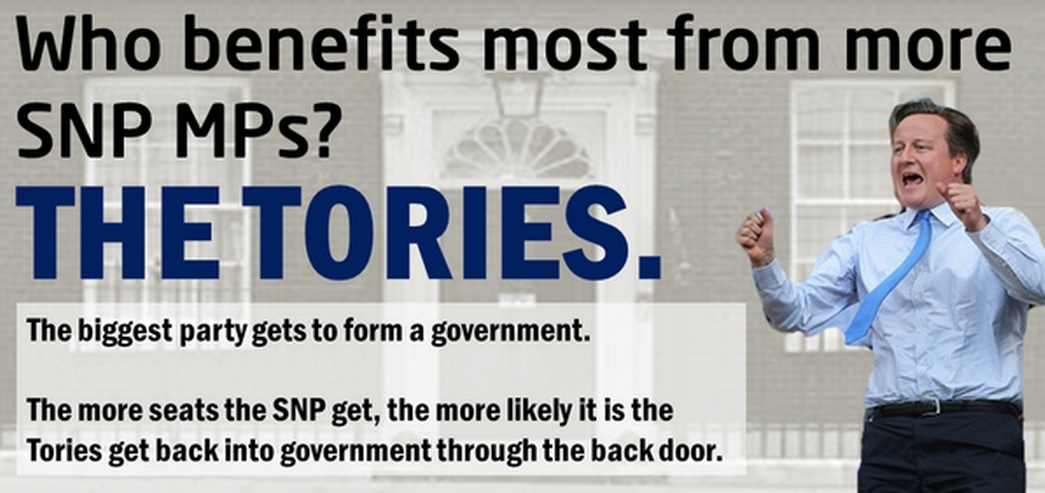by Jadon Buckeridge
 |
| The Kingmaker? |
6 months ago - almost to the day -
armies of confused, frustrated, kilted scots stood suicidal, wavering precariously on the edge of a cliff.
They stared united into the dark, Salmond-shaped abyss of national independence.
Mesmerised, the English, the Welsh, and even the Irish observed the sea of
Saltires flooding through Glasgow, Edinburgh, and even the Highlands. As the
chilling waters of defeat slowly dampened the spirits of the Westminster
hierarchy, the most unlikely of alliances was formed to beat back the
nationalist offensive. The Three Amigos - Cameron, Clegg and Miliband - were
united at last, and the going looked tough for Salmond's weary one-man band.
If the Westminster spin doctors didn't
spot the irony of sending Eton Mess, broken promises, and a strange,
bacon-munching cartoon character to pacify this raging, anti-elitist political
time bomb, they probably should have. Initially, the more Westminster tried to
coax Scots back from the dark side of independent rule, the further they
slipped into the grubby palms of Alex Salmond. Suddenly, all seemed hopeless
again. The polls began to converge, shameless scaremongering was failing
miserably, and Alistair Darling found Salmond's unwavering charisma impossible
to stomach in the debates. It was make or break time for the No Campaign, and
already the cracks were beginning to surface.
Everyone now knows that Scotland
bottled it: whether it was Gordon Brown's rhetorical wizardry, a sentimental
attachment to their favourable financial arrangements, or the levelled glare of
common sense staring them in the face, it was a no for the Yes Camp. Salmond,
gracious in defeat, skulked back to his office in Holyrood to prepare his
heartfelt resignation - which lasted all of about 2 months - and the political buzz,
which had clung to 85% of voting age Scots, slowly began to fade into the past.
But it's election time for the rest of us now, and as polling day begins to
loom menacingly in the distance, minds are being cast back woefully to the
Scottish referendum: when Scotland began to complain about the living
arrangements, perhaps we should have shown them the door.
If, which seems likely, a majority is
not achieved by either Labour or the Tories, the vultures will come circling:
UKIP, currently polling in the region of 15%, the Libdems, lagging behind on
9%, and even the Greens, in the capable hands of the forgetful Nathalie
Bennett, all want a slice of the pie. But none of these parties can compete
with the SNP: despite flatlining well below 5% in the polls - well behind 5
other parties nationally- they are polled to achieve 50 more seats than UKIP
and the Greens combined. Nicola Sturgeon could soon be the king maker.
Members of the SNP are often asked
what influence they might have with a strangle hold in the heart of government.
'Holding Labour and Westminster to ransom' is common terminology for what we
can expect of them, but it's no wonder. Showing Alex Salmond the way to
Westminster is about as constructive as sending UKIP to run the EU. 'Upsetting
the apple cart' is how Salmond plans to put the brakes on the evils of Tory
austerity, and bring power back to the people of Scotland, but as Britain
emerges from a period of economic slump, the 'apple cart' does not need
upsetting. Admittedly, the SNP have little reason to play a constructive role
in any UK government: successful cooperation within the union is a sure fire
way of undermining their entire independence objective. But that is precisely
the reason why they should be kept out of Parliament at all costs.
What the Scottish Nationalists could
actually achieve is a very grey area: no one is certain what hand they
might play in negotiations with the Labour Party, and rhetoric from Nicola
Sturgeon in response to questions on the issue suggests she probably isn't sure
either. But the British parliamentary system is bound to suffer integrity at
the hands of the ruthless SNP. As the First Minister has indicated - though,
granted, without a great deal of decision- the nationalists will likely steer
clear of any formal coalition. The role of little brother, played by Clegg in
this government, has proved disastrous, and is not worth repeating for a cozy
office in London as far as Nicola Sturgeon is concerned.
But what coalition has provided us
with is stability. It's been a long time in British politics since one of these arrangements; the last was during
the heat of WWII: but as far as the nation is concerned, it's been far from a
disaster. An 'issue by issue' agreement, however, - one the SNP are hoping to
engage in- could be just that. Without a stable government, the leading party
has no guaranteed power at all: all legislation relies on the lobbying of
external support, and policies are left exposed to damaging, cross-party
compromise. As is the case with much of what the SNP espouses to its
cheerfully sanguine supporters, there is nothing concrete about an 'issue by
issue agreement'. To predict the lifespan span of such an arrangement to be any
longer than 2 years would be wilfully optimistic. If 2 years being guided by
the SNP hadn't done enough to ruin Britain's economy, the uncertainty
surrounding the second general election in as many years would finish the job
Salmond and Sturgeon had gleefully started.
There is, however, significant political
capital at stake for the SNP. As a Scottish minister recently expressed on the
BBC's Question Time, 'the people have not abandoned Labour; Labour have
abandoned the people.' Predictably, such shameless political stone throwing was
greeted with rapturous applause by the even-handed, objectively minded audience
- but there is a serious point too. Sturgeon and Salmond cannot stalk around
outside the gates of Westminster, heckling the Labour Party for cozying up to
the Tories, and then, having stolen the key to the bedroom, jump in the bed for
a three way: to maintain current levels of support, the nationalists will be
forced to differentiate themselves from Labour wherever they see fit. But it's
worth bearing in mind that the last time the Scottish Nationalists had enough MPs
to make a difference - during the Labour government of Jim Callaghan - they did
nothing to help Scotland: instead they dug Labour's grave and opened the
gates for the Tories' most ruthless Prime Minister . Without the SNP's
abandonment of the Labour leadership in a vote of confidence, Margaret
Thatcher, nemesis of the Left, would have remained safely in opposition.
If the SNP decide to engage in dodgy
dealings with the "Milibandwagon" after the election in May, defence
is an inevitable talking point, and, Trident being one of the few policies on
which the two parties are categorically opposed, it could prove a painful
negotiation. Nicola Sturgeon, who opposes nuclear weapons as a matter of
principle, is unlikely to support the immoral stance of the Labour Party,
who, being strangely and unreasonably concerned with our national security, are
fighting for the renewal of British Trident Missiles. But is the Labour Party
really being unreasonable, or might it be the SNP?
We owe the First Minister a degree of
sympathy: without the benefit of foresight, she argued passionately on national
television, deploring the government's stringent attitude towards the future of
our nuclear defence system, but was shot down by the Economist just two weeks
later. The front page of this global magazine read plainly:
'The new nuclear age'. Less sympathy is deserved in light of their own
military spending agenda. As part of their grand plan for independence, the SNP
announced £2.5bn worth of cuts to what would be their defence budget. Given the fact the UK is also
reducing its budget for military spending - in real terms at least - this might
not sound catastrophic, but as a proportion of GDP, it certainly could be. The
Scots, scarcely spending in excess of 1.5% GDP on defence, would risk being
shown the door by NATO. A record like that is worth considering when analysing
the potential impact of the SNP on our government.
The economy is another inevitable
point of debate between the two parties, and once again, perfect alignment is
not an option: compromises will be made on both sides of the negotiating table. In the run up to the general election,
the SNP have ditched the sound bites of the Yes Campaign in favour of a more
universal anti-austerity message. While it's understandable that Salmond and
Sturgeon have have done their utmost to replicate the hype of Syriza's
anti-austerity movement here in the UK, the future looks ominous for a UK
economy in the scheming hands of Alex Salmond.
If, for a moment, we forget what they
say, and judge what they do, here is what the SNP have done. Having
relentlessly plugged the anti-austerity message in Scotland, forcing the evils
of Westminster down the throats of an impressionable electorate, it transpired
that actually, the Scots were getting a rather good deal. Every Englishman and Englishwoman received an average of just over £8000 of public money every year, while
the average Scot reaped benefits exceeding that about by over £1500
pounds. Strangely, Mr Salmond never mentioned it.
There's also a strong sense of
hypocrisy surrounding the accusations that the SNP have continuously levelled
at the Tories. In the same year Salmond had continuously lamented the extent to
which Cameron and his public school comrades had squeezed the life out of the
Scottish budget, the Scottish Parliament themselves achieved the largest
underspend on record. Holyrood - and it beggars belief, given the full fiscal
autonomy the SNP now demand - failed to
allocate over 5% of the education budget, and left almost half a billion pounds (money handed to Holyrood for the operation of Scottish public services) sitting in the bank. Swathes of Scots have flocked into the open arms of the
SNP in recent months, disgusted by the grey-suited, budget-slashing busybodies
of Westminster. But demands for devolution are tarnished by political
insincerity given the SNP have neglected to use their existing powers for tax
variation, failed to fully fund their public services, and screwed Labour led
councils out of millions, while bank rolling their own.
A final piece of SNP literature that
casts ungainly aspersions on their credence as economic policy makers was their
white paper - a guide to independence. In it, the SNP recognised significant
levels of dependence on oil were a
fundamental part of the Scottish economy, but their projections with regard to
revenues from oil have been the subject of much scrutiny in the wake of the
referendum. £20 bn was forecast in revenues from
oil over a 3 year period leading up to 2018, assuming a stable oil price of
$110 per barrel. But much to Salmond's
dismay, within 6 months of this projection, the oil price have plummeted
to below $50 per barrel, and the minds behind the white paper had scurried off
with their tails between their legs. The revised projections, with oil prices
laying stable at $50 per barrel, predict revenues to fall below £2bn
over the same period - less than 10% of the SNP's initial 'hit and hope'
figure. It's no wonder that SNP economic
policy makes even the big borrowers in the Labour Party look fiscally
responsible.
Ultimately, recent Tory propaganda has
summarised the reality of the situation. If the tide doesn't turn against the
SNP soon, Westminster runs the risk of becoming a puppeteering parliament, with
Alex Salmond pulling all the strings. Whether or not the former First Minister
has pocketed Ed Miliband is yet to be seen, but if an army of Scottish
Nationalists marches down to Westminster on May 7, they might well pocket the
United Kingdom.



Comments
Post a Comment
Comments with names are more likely to be published.